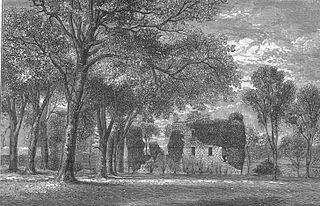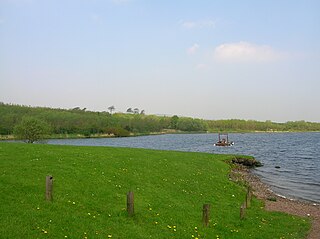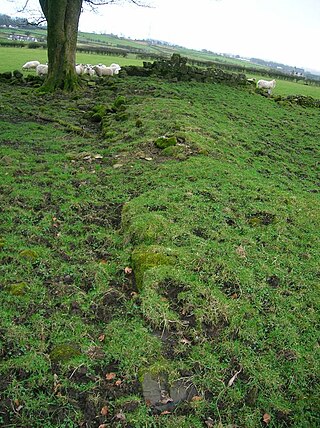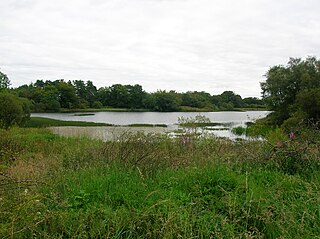Related Research Articles
Beith is a small town in the Garnock Valley, North Ayrshire, Scotland approximately 20 miles south-west of Glasgow. The town is situated on the crest of a hill and was known originally as the "Hill o' Beith" after its Court Hill.

Robert Smith Candlish was a Scottish minister who was a leading figure in the Disruption of 1843. He served for many years in both St. George's Church and St George's Free Church on Charlotte Square in Edinburgh's New Town.
Ronald James Stevenson was a Scottish composer, pianist, and writer about music.

Oban distillery is a Highland single malt Scotch whisky distillery located in the Scottish west coast port of Oban. Established in 1794, it was built before the town of the same name, which sprang up later in the surrounding craggy harbour.

Springfield railway station serves the village of Springfield in Fife, Scotland. The station has two platforms and is unstaffed. Services are operated by ScotRail.
Baron Hume of Berwick was a title which has been created twice. The first creation was in either the Peerage of England or the Peerage of Scotland. The second creation was in the Peerage of Great Britain.

Hessilhead is in Beith, North Ayrshire, Scotland. Hessilhead used to be called Hazlehead or Hasslehead. The lands were part of the Lordship of Giffen, and the Barony of Hessilhead, within the Baillerie of Cunninghame and the Parish of Beith. The castle was situated at grid reference NS380532.

The Barony of Giffen and its associated 15th-century castle were in the parish of Beith in the former District of Cunninghame, now North Ayrshire. The site may be spelled Giffen or Giffin and lay within the Lordship of Giffin, which included the Baronies of Giffen, Trearne, Hessilhead, Broadstone, Roughwood and Ramshead; valued at £3,788 9s 10d. The Barony of Giffen comprised a number of properties, including Greenhills, Thirdpart, Drumbuie, Nettlehirst and Balgray, covering about half of the parish of Beith. Giffen was a hundred merk land, separated from the Barony of Beith, a forty-pound land, by the Powgree Burn which rises on Cuff hill. The Lugton Water or the Bungle Burn running through Burnhouse may have been the Giffen barony boundary with that of the adjacent barony and lands of Aiket castle.
Beith Football Club were a football club based at Bellsdale Park in Beith, Scotland. The club were members of the Scottish Football League from 1923 to 1926.
The 1890 Home Nations Championship was the eighth series of the rugby union Home Nations Championship. Six matches were played between 1 February and 15 March. It was contested by England, Ireland, Scotland and Wales.

Kilbirnie Loch is a freshwater Loch situated in the floodplain between Kilbirnie, Glengarnock and Beith, North Ayrshire, Scotland. It runs south-west to north-east for almost 2 km (1.2 mi), is about 0.5 km (0.31 mi) wide for the most part and has an area of roughly 3 km2. It has a general depth of around 5.2 metres to a maximum of around 11 metres. The loch is fed mainly by the Maich Water, which rises in the Kilbirnie Hills near Misty Law, and is drained by the Dubbs Water that runs past the Barr Loch into Castle Semple Loch, followed by the Black Cart, the White Cart at Renfrew and finally the River Clyde. The boundary between East Renfrewshire and North Ayrshire, in the vicinity of the loch, runs down the course of the Maich Water along the northern loch shore to then run up beside the Dubbs Water.

The old Barony and castle, fortalice, or tower house of Hill of Beith lay in the feudal Regality of Kilwinning, within the Baillerie of Cunninghame, and the Sherrifdom of Ayr, now the Parish of Beith, North Ayrshire, Scotland.

Barkip, also known as The Den, is a hamlet in North Ayrshire, Scotland about three miles southwest of Beith on the A737 road to Dalry. The earliest recorded name is 'Blairkip'. In the Gaelic language, the name Barkip comes from bar ("top"), and kip. It is not clear when or why the name 'The Den' started to be used although it appears in the local press as both in 1898, however in Scots as in old English one meaning is 'A hollow between hills,' which is certainly an accurate description of the geography of the area that Barkip lies in. Following construction of a new road, Barkip no longer sits on the main Beith to Dalry road.
Events from the year 1891 in Scotland.

The lands of Marshalland, Marsheland, Marsheyland or Marshyland were part of the holdings of the Barony of Beith, Regality of Kilwinning and Bailiary of Cuninghame. They became the property of the Lyle family, then the Shedden family, passing next to the Spier's family before finally becoming part of the Spier's Trust lands. The laird's house and farm were demolished in the 1960s.

The lands of Threepwood were located in the Parish of Beith, at the eastern boundary between East Renfrewshire and North Ayrshire, Scotland. The settlements of Midtown, Townhead and Townend were part of the old Threepwood Estate. Cuffhill at 675 feet is the highest eminence in the parish and it overlooks the area with Little Hill and Cuff Hill and Little Hill plantations nearby, now situated next to the entirely artificial Cuffhill Reservoir.

The lands of Brownmuir, Brown Muir (1832) or Brimmer (1821) in Scots were located in the Parish of Beith, at the western boundary between East Renfrewshire and North Ayrshire, Scotland. The settlements of Brownmuir and Rakerfield were part of the old Brownmuir Estate. Brownmuir or Brimmer Hill at feet is a prominent eminence in the parish and it overlooks the area with Lochlands Hill and Cuff Hill relatively nearby. The old estate of Threepwood lay to the east.
Events from the year 1800 in Scotland.

Coldstream Mill, near Beith in North Ayrshire, Scotland, was an early 19th century meal mill powered by the Dusk Water and Whitestone Burn that was enlarged from an existing much earlier watermill. The mill worked until 1991 and was the last traditional working water mill in Ayrshire and one of the last continuously worked watermills in Scotland. The mill buildings have been converted into a private dwelling and the mill pond has been retained.
References
- 1 2 "Obituary MR WILLIAM STEVENSON, J.P." The Glasgow Herald . 28 October 1941.
... a well-known figure in the furniture and timber trades in Scotland and England.
- ↑ "Beith, Stevenson Higgins And Company, Cabinet Works". Royal Commission on the Ancient and Historical Monuments of Scotland.
Archaeological Notes NS35SW 26 3478 5443 (Location cited as NS 348 544). Janefield Cabinet and Chair Works, Beith, founded c. 1883 by Stevenson, Higgins and Co. A two-storey and attic, red-brick block on an L plan, now a foundry. - J R Hume 1976.
- ↑ Hume, John R. (1976). The Industrial Archaeology of Scotland: The lowlands and the borders. Macmillan of Canada. ISBN 9780770514730.